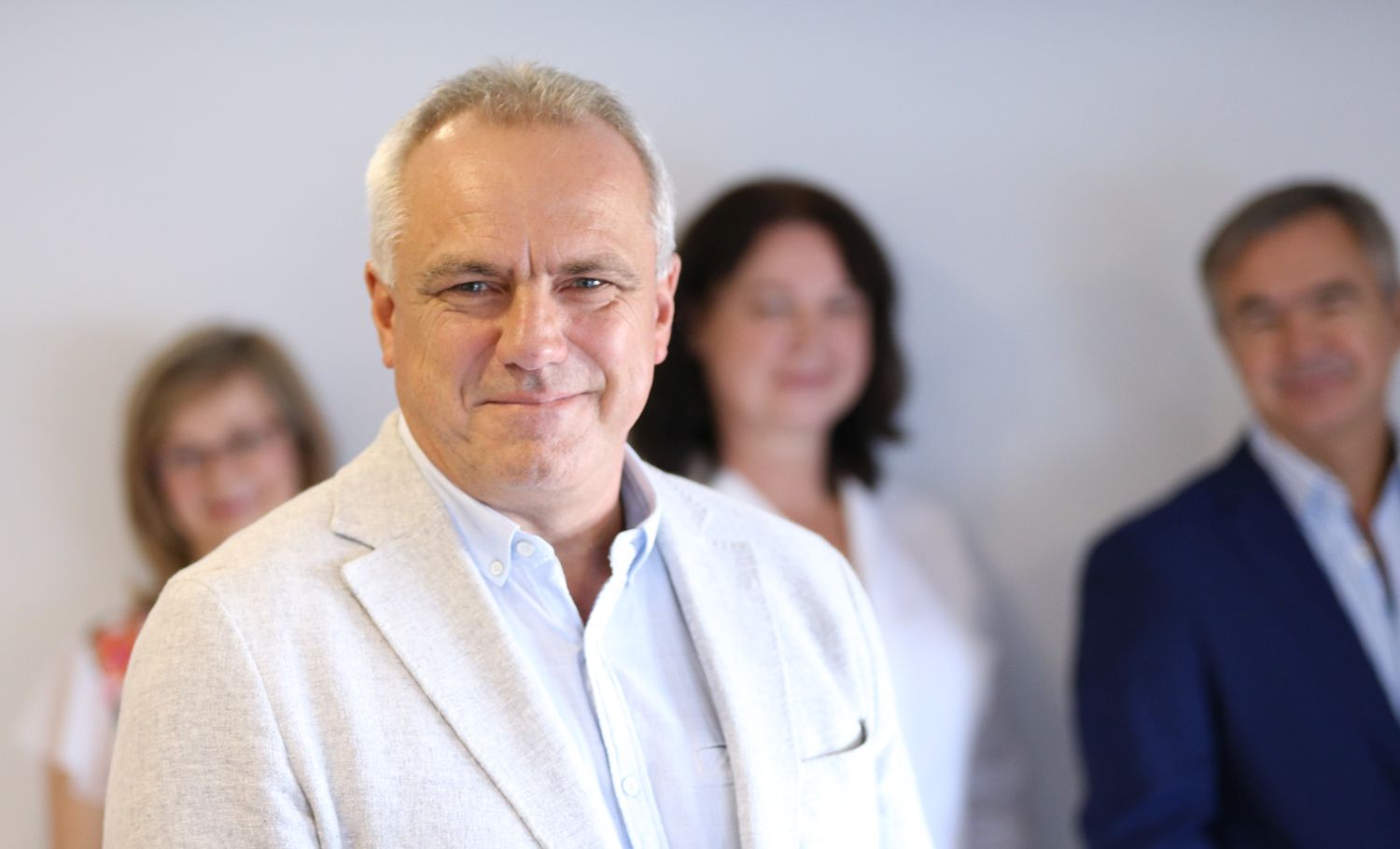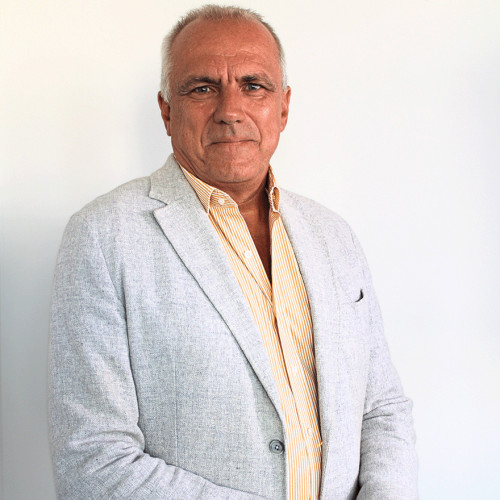
It made me open…
My mother is a teacher, my father is a chemical engineer who became a commercial advisor in England, so I went to an English school at the age of 6, where I learned English at a native level. This was during the years of socialism, when the borders were still quite closed. Getting to know another country, getting to know different people, the rhythm of life and lifestyle of the English, meeting black and yellow people was a great experience for me and made me extremely open. I came home at the age of 10.
It will be good in the end…
After primary school, I got into Apáczai Gymnasium with a very serious admission, also in a special class. This did me a lot of good. Although we hated being there and every minute was suffering, we felt even then that it would be good in the end. And it did. It was a training camp, where they taught me a lot of things, most importantly how to study. From the very first moment, they trained us so that if we were to be in a leadership position, we would be able to speak, improvise, stand up in front of people, and behave accordingly.
I wanted to be a chemist…
Originally, I wanted to be a chemist because my father was a chemist. Once, I found my father’s lab in the basement and started playing with it. I was in the top ten on OKTV two or three times, which allowed me to get into university without an entrance exam. But once, I only came in 12th, and my chemistry teacher made fun of me and said things that made me feel ashamed. Well, that’s when it was decided that I wouldn’t be a chemist. It’s incredible what twists and turns a person can have in their fate…I ended up going to medical school.
University years…
I graduated from university very easily because of Apáczai, and that’s when I started playing sports. At first, I wanted to be a urologist, but around the fourth quarter, I turned to surgery. Meanwhile, I took on a nursing job at the Margit Hospital from my first year, then I was a nurse and an operating room boy in the intensive care unit. I wasn’t really in need, that’s not why I did it. First of all, I like to work and I was interested in the profession, I would have gone around without pay, but back then there was still student work, they were happy to hire students, it’s a shame that this has now ceased. In England, for example, before you apply to university, you are required to go to a hospital in the summer to see a few things, which is a good idea because some people realize by the end that they are absolutely not interested in the whole thing.
Starting my career…
The hospital in Esztergom signed a scholarship contract with me to work there after graduation. I started in the department of Lajos Mátyus, who is one of the direct students of Imre Littmann (the creator of Hungarian surgery). His name was a concept, and it was a good feeling to get to know at least one of the great surgeons of the past in person.
When Lajos Mátyus retired, Mihály Jankovics from Miskolc took over. He was an interesting personality, a scion of a baronial family that had been relocated to the countryside. We became close friends from the very first moment, and he really liked me. And since he was involved in the management of surgical societies, he almost always appeared at congresses as a speaker and president. In just a few years, while still quite young, the profession was already known in the country as “Péter”.
Laparoscopic surgery…
I first heard about laparoscopic surgery in 1992, when it was not yet known at all in Hungary. At that time, everyone said that keyhole surgery was crap and that it had no future. I somehow felt that it did and hitchhiked to Amsterdam. A large building had the words Britten House, surgery (surgery) written on it, and that it was Professor Benzdorf. There was a very nice person inside, to whom I told him that I came from Hungary and since there was no laparoscope in Hungary yet, it would be nice if I could come here. I went there with an invitation letter for six months. Of course, I had no money, I got an apartment by operating on someone who had gone on a trip around the world, his apartment remained empty, I moved in. He also left a car there, and I got a car. In the end, I came home with a little extra money and the knowledge, with the proof of which the Esztergom hospital, along with the clinics, was among the first to receive a laparoscope for free, because there was no one else who knew how to use it. In fact, I was not yet a specialist at the time, but my boss said that he would have his back. That was how my laparoscopic career began.
Proctology
A few years later, someone told me that there was a new private hospital, and they were looking for surgeons. At first, I took on the duty, but after six months, the head of the department, the professor of surgery, fell ill. By then, they had experienced my work and asked me to be the chief physician, so in 1999, after 10 years of medical practice, I became the chief surgeon of the department.
That's where I discovered proctology, because it turned out to be an incredibly white field. It turned out how few people work in it and how unskilled it is. Six years ago, I was elected to the board of the proctology society. I'm proud of this because I got there on my own merit, based on my results, and the first from the private sector.
Róbert Private Hospital
When I changed, my colleagues from Róbert Hospital visited me. It turned out that we shared interests with some young gynecologists who are also outstanding in their profession. I saw that the equipment and the environment met the quality expectations that private healthcare should have. Here, you have to be able to work without errors, and for this you need a suitable environment. In comparison, they can keep their prices almost unrealistically low. This is where I started to deal with the newest white area of healthcare, which is called perineology. This treats the female pelvis as a connected system.
The Pelvic Medicine Center is a dream come true
Around 2010, I came across the concept of perineology, which means barrier medicine. The holistic approach that I had the opportunity to encounter in Belgium was very nice. My experience is that until now, the activities of the gynecologist, surgeon, urologist, and physiotherapist have been sharply separated, and pelvic problems are located precisely in these border areas. The professionals should work together as a team to ensure that the patient receives the appropriate medical care as quickly as possible. The time has come to introduce this complex approach in Hungary, since almost every hospital in Western Europe now has a perineology center.
Why this, why that?
I don't think about why I do this. I led whitewater tours for a long time. We were drifting down a river at high speed and came across an obstacle. The water flows faster near the obstacle and I have to solve that problem with a combination. If I don't solve it well, I will fall over and drown. There are several combinations. It's like surgery. The patient comes, his stomach hurts, I open it up. Then I see what's there. Then I decide again, and with a series of good decisions I have to find the path to the solution. In a situation, I can calmly decide and perform. For example, during surgery, I don't sweat, I don't get nervous, but afterwards I can't sleep very well. There are surgeons who fall apart during surgery and the whole surgery falls apart, everyone screams and blood spurts. That's why I chose the so-called extreme sports, the rest are boring. I like sailing, I like when there's strong wind, I like when there's a situation, but I don't like competing. I don't like being photographed, I don't like standing with trophies, I don't do it for recognition.
Family
I grew up in a calm, balanced family, which was founded on my mother's family-centeredness and my father's financial background. I can say that we are a pretty good family.
The most typical story about this is when my wife broke her leg while skiing, and we called my mother. And it wasn't like, oh my, but okay, who's going to pick up the kids from school, who's going to buy bread, I have surgery tomorrow... and everyone lined up where they needed to be, there was no panic, no rush, no hysteria. Just like in the operating room...


 Log in with GoodID
Log in with GoodID